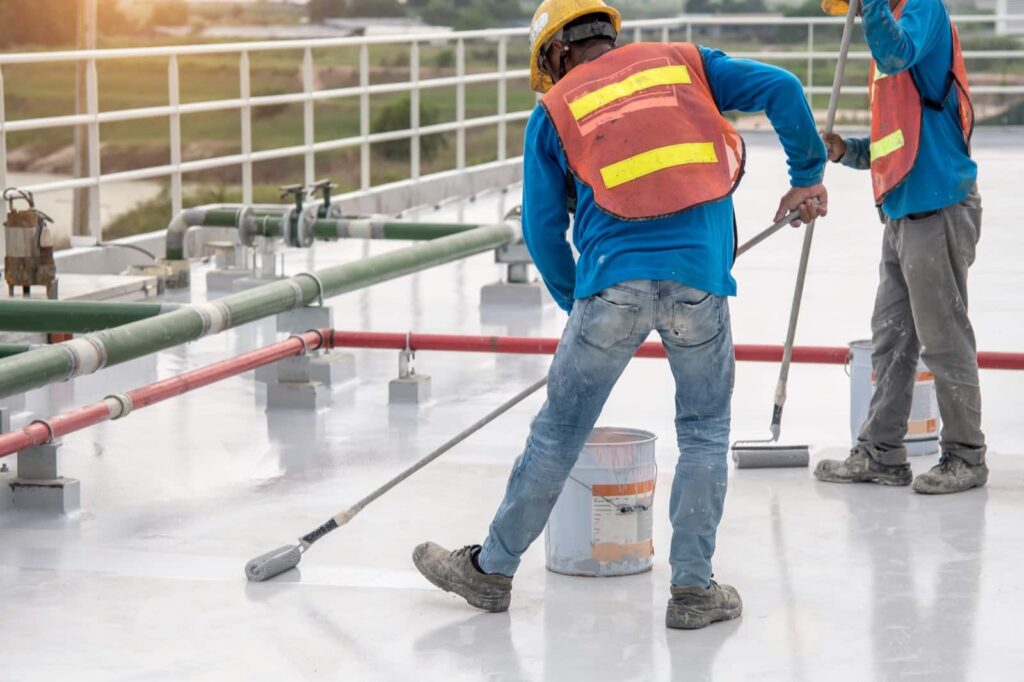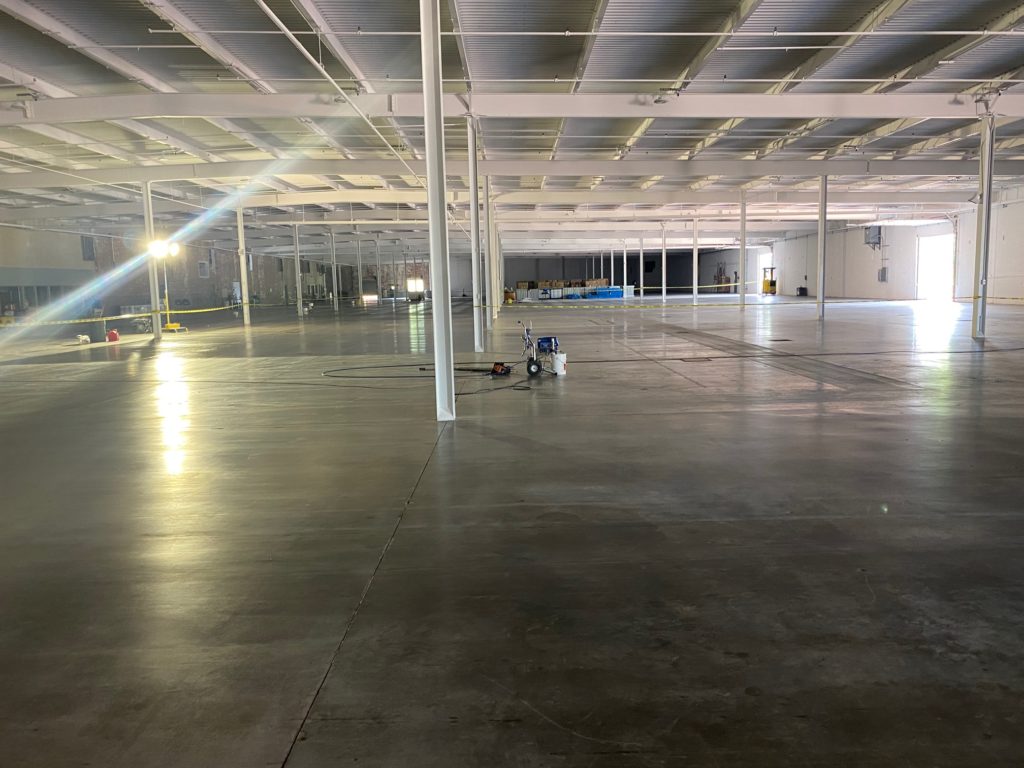Do Concrete Floors Need To Be Sealed?
Have you ever wondered why concrete floors need to be sealed? This seemingly trivial step is often overlooked but can make a significant difference in the durability and appearance of your surfaces.
Sealing your concrete floors adds an extra layer of protection against daily wear and tear, spills, and stains. However, the question remains: How does it work precisely? What are the potential consequences of skipping this step? Let’s investigate the details and discover why it is essential to seal your concrete floors.

Why Do Concrete Floors Need To Be Sealed?
Concrete floors need to be sealed for several reasons, each contributing to the longevity and aesthetic appeal of the surface. Here are some of the most critical reasons, which we will discuss in detail:
- Protects Against Stains: Concrete is a porous material with tiny holes and gaps that can absorb liquids. Sealing these pores prevents spills from penetrating deep into the concrete, making cleaning easier.
- Increases Durability: By sealing your concrete floors, you create a barrier that protects them from daily wear and tear. Concrete can easily chip or crack without proper sealing, especially in high-traffic areas.
- Enhances Appearance: Sealing your concrete floors can give them a polished and glossy look. It also helps to bring out the natural variations and patterns in the concrete, making it visually appealing.
- Prevents Moisture Damage: Concrete floors can absorb moisture if left unsealed, leading to mold growth and potential structural damage. Sealing prevents moisture from seeping into the concrete, keeping it dry and protected.
- Makes Floors Easier to Clean: Sealed concrete floors are less likely to accumulate dirt, dust, and other debris. They are also more resistant to stains and can be cleaned with a simple mop or broom.
How Does Concrete Floor Sealing Work?
Concrete floor sealing is a relatively simple process that involves applying a protective coating over the surface. The sealant typically combines polymers and resins, creating a sturdy barrier on the concrete. Applying a sealant reveals the true beauty of a concrete floor as it enriches the color and adds a glossy finish.
The sealant penetrates deep into the pores and gaps of the concrete, filling them up and creating a solid layer that prevents liquids and other substances from seeping in. This process makes the concrete more resistant to damage and enhances its appearance.
Certain floor sealers create a protective layer on the concrete surface, while others penetrate the floor. The latter type is often preferred for areas with heavy foot traffic since it does not wear off as quickly.
The Consequences of Not Sealing Your Concrete Floors
Skipping the step of sealing your concrete floors may seem harmless, but it can have significant consequences. These are some potential issues that can arise from not sealing your concrete floors:
- Stains and Discoloration: As previously stated, unsealed concrete is porous and susceptible to stains and discoloration. Spills quickly seep into the concrete without a protective layer and leave stubborn marks.
- Damage from Chemicals: Concrete is susceptible to chemical damage, such as cleaning solutions and oil leaks. Sealing your concrete floors can prevent these substances from causing permanent damage.
- Cracks and Chips: Unsealed concrete floors are likelier to develop cracks and chips, especially in high-traffic areas. These imperfections decrease the floor’s durability and affect its appearance.
- Moisture Damage: As mentioned earlier, moisture can cause serious damage to unsealed concrete floors. It can lead to mold growth, structural damage, and even compromise the integrity of the surface.
Things To Consider Before Sealing Concrete
Before diving into the process of sealing your concrete floors, there are key considerations that can impact the success and effectiveness of this protective measure. Here are a few things to keep in mind:
- Surface Preparation: Proper surface preparation is crucial before sealing your concrete floors. Ensure the surface is clean, dry, and free from existing coatings, dirt, or debris. Thoroughly cleaning the surface will enhance the sealant’s effectiveness and promote better adhesion.
- Type of Concrete: Different types of concrete may require specific sealants. Consider the composition of your concrete floors, whether newly poured or existing, as this can impact the choice of sealant. Understanding the particular needs of your concrete will result in a more tailored and effective sealing process.
- Climate Conditions: The climate in your region can influence the choice of sealant and the ideal time for application. Extreme temperatures or high humidity can affect the curing process of the sealant. Be mindful of the weather conditions and choose an appropriate time to seal your concrete floors for optimal results.
- Purpose of the Space: Consider the function and purpose of the space where the concrete floors are located. High-traffic areas like commercial spaces or entryways may require a more durable and abrasion-resistant sealant. Understanding the intended use of the space will help you select the correct type of sealer for long-lasting protection.
- Maintenance Requirements: Different sealers may have varying maintenance needs. Some may require periodic reapplication, while others offer long-term protection with minimal upkeep. Consider your willingness and ability to maintain the sealed floors over time, as this can impact your choice of sealer.
- Drying Time: Be aware of the drying time required for the chosen sealant. Plan the sealing process accordingly, allowing sufficient time for the sealant to cure before exposing the floors to foot traffic or other activities. Rushing the drying process can compromise the effectiveness of the sealer.
- Budget Considerations: Lastly, evaluate your budget for the sealing project. Sealants come in various prices, and choosing the right one involves balancing cost with performance.
Let Us Take Care of Your Concrete Floors
Concrete floors need to be sealed to preserve their integrity, enhance their appearance, and extend their lifespan. It guards against stains, discoloration, chemical damage, and cracks. Neglecting to seal concrete floors can have serious consequences, such as moisture damage that compromises the surface’s structural integrity.
McLean Company is here to help seal your concrete floors, ensuring they remain durable and visually stunning for years. We are experts in our field and guarantee top-quality results regarding commercial and industrial flooring and painting. Contact us today to learn more about our concrete sealing services and how we can help protect your investment.


